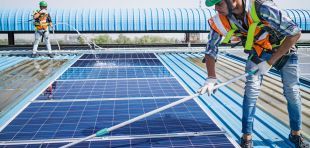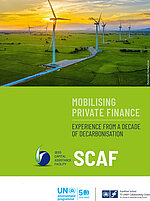New funding for renewable energy projects in Africa and Asia

Five new partners joined UN Environment's Seed Assistance Facility.
Global investment in renewables hit 285.9 billion US Dollar in 2015. Especially developing nations are investing more in renewable energy. But even though 2015 produced a series of encouraging records for investment in renewable energy, far more needs to be done. The Seed Capital Assistance Facility (SCAF) helps managers of private equity funds and development companies provide necessary seed financing and enterprise assistance to early-stage clean energy project developers and entrepreneurs, filling the gap between the “lack of bankable projects” and available finance.
In a region like sub-Saharan Africa where, 600 million people lack access to electricity, access to clean energy could offer profound improvements in quality of life, economic development and environmental sustainability. “Entrepreneurs can transform markets, but if they cannot even get started, then change is blocked. This is why seed capital is so important,” said Ligia Noronha, Director of UN Environment’s Economy Division. “In clean energy, start-up costs can be modest, but they are still all too often perceived as too risky to attract third-party financing. Under-capitalized developers and entrepreneurs often lack business development skills and are unable to bring their ventures to operation, restraining the progress of their countries towards low-carbon development.”
After a successful initial Phase I, the SCAF has launched a second phase in 2016. Five new agreements have already been signed with fund managers engaged in clean energy projects in Asia and sub-Saharan Africa. The Facility’s second phase is implemented by UN Environment on funding contributed by the Department for International Development which leads the United Kingdom’s work to end extreme poverty, and by the Federal Ministry for the Environment, Nature Conservation, Building and Nuclear Safety (BMUB), under its International Climate Initiative (IKI).
The three funds DI Frontier Market Energy, Carbon Fund and JCM Clean Development Fund have received support for strengthening their renewable energy projects in sub-Saharan Africa. They recently received co funding support for the development of a 10 megawatt (initial phase) geothermal project in Kenya, a 12 megawatt hydro project in Uganda, and an 80 megawatt solar project in northern Nigeria.
In Asia, windfarm project developer The Blue Circle received co-funding support for the development of three projects in Vietnam, Cambodia and Indonesia, markets where wind production is still in its infancy. Olivier Duguet, CEO of The Blue Circle, said the Facility was “a great instrument that helps us seize opportunities we would otherwise find difficult to take. SCAF provides adequate support to bake our ventures in promising but rather untapped frontier markets”.
Zoscales Partners received support for the establishment of the East Africa Growth Equity Fund, an Ethiopian fund for small and medium-sized enterprises with a focus on resource efficiency. “Small and Medium Enterprises belong to Africa’s most important private sector participants. Through the financial support from SCAF we can overcome liquidity constraints during the fundraising period and once operational help our investee companies reduce environmental footprint,” said Jacop B. Rentschler, Managing Partner of Zoscales.
GreenWish Partners will develop on- and off-grid renewable energy projects in Western Africa. The company recently inaugurated its first project, the 20 megawatt Senergy photovoltaic plant in northern Senegal. Charlotte Aubin-Kalaidjian, Chief Executive of GreenWish Partners, said “SCAF helps us to leverage West Africa’s vast renewable energy potential. The support of our projects does not only facilitate access to clean electricity, it also eases new business opportunities, especially in rural areas.”
The five funds that have so far partnered with the Facility in this phase are aiming for a total capitalization of more than 363 million US Dollar, of which nearly 35 million US Dollar will go to seed investing. The Facility will provide 15 million US Dollar of additional support to help transfer this early-stage support to clean-energy entrepreneurs, and ultimately to advance the Paris Agreement’s target of keeping a global temperature rise of this century below 2 degrees Celsius.
The link has been copied to the clipboard
Contact
IKI Office
Zukunft – Umwelt – Gesellschaft (ZUG) gGmbH
Stresemannstraße 69-71
10963 Berlin




